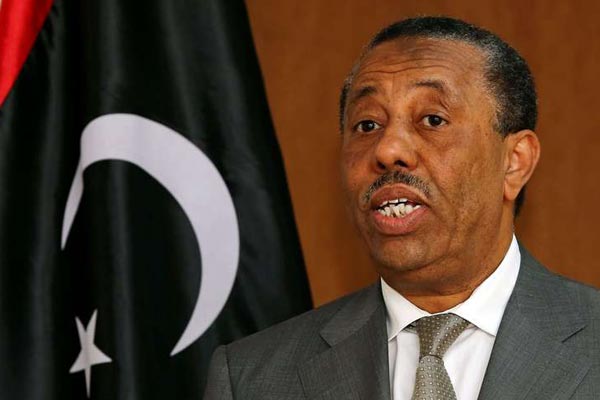Libya PM Abdullah al-Thani resigns live on TV hours after peace talks restart

The prime minister of Libya’s internationally recognised government, Abdullah al-Thani, announced his resignation in a surprise move live on television Tuesday, hours after fraught peace talks between the country’s rival factions restarted.
During the talk show Prime Minister Al-Thani faced a barrage of angry questions from citizens who blamed his government for the lack of basic services such as electricity and poor security in areas it controls.
“If my exit is the solution, then I announce it here,” al-Thani said during the talk show, adding that “my resignation will be submitted to the parliament on Sunday”.
The prime minister, who escaped an assassination attempt in May when gunmen opened fire on his car after a parliament meeting, was also hit with accusations of corruption against his government in the television interview Tuesday.
Libya, which plunged into chaos after the fall of Muammar Gaddafi in 2011, currently has two rival parliaments vying for power as well several militia groups battling for control of the country’s vast resource wealth.
Al-Thani’s elected government has been working out of a small eastern city near the border with Egypt since an Islamist militia alliance captured the capital Tripoli last year.
Earlier Tuesday the two rival factions started a new UN-sponsored round of peace talks in Switzerland’s Geneva aimed at creating a unity government, with representatives of the powerful Tripoli parliament joining the negotiations after boycotting them last month.
United Nations special envoy Bernardino Leon, who is brokering the talks in Geneva, is urging the key camps to reach a political deal in the hope that a unity government could enforce a durable ceasefire.
Libya is gripped by spiralling insecurity with Benghazi, the main city in the country’s east, caught in a daily war between pro- and anti-government militias and forces.
The international community recognises the parliament that sits in the eastern port city of Tobruk, which installed the controversial General Khalifa Haftar as its army chief in March.
A partial peace deal aimed at restoring stability was reached last month, but leaders of the Islamist-backed General National Congress (GNC) parliament that sits in Tripoli boycotted the pact, calling it “unsatisfactory”
Nation